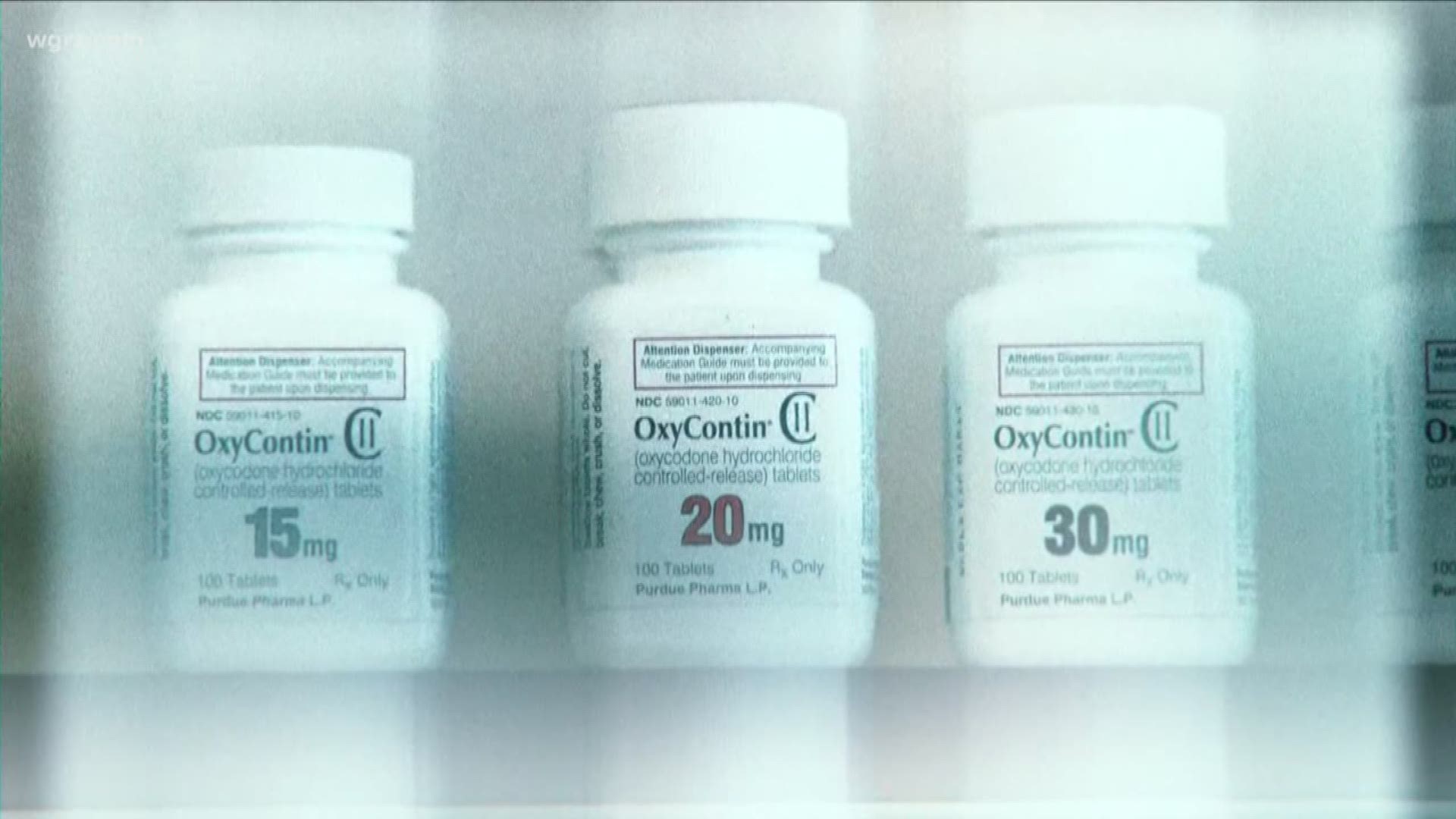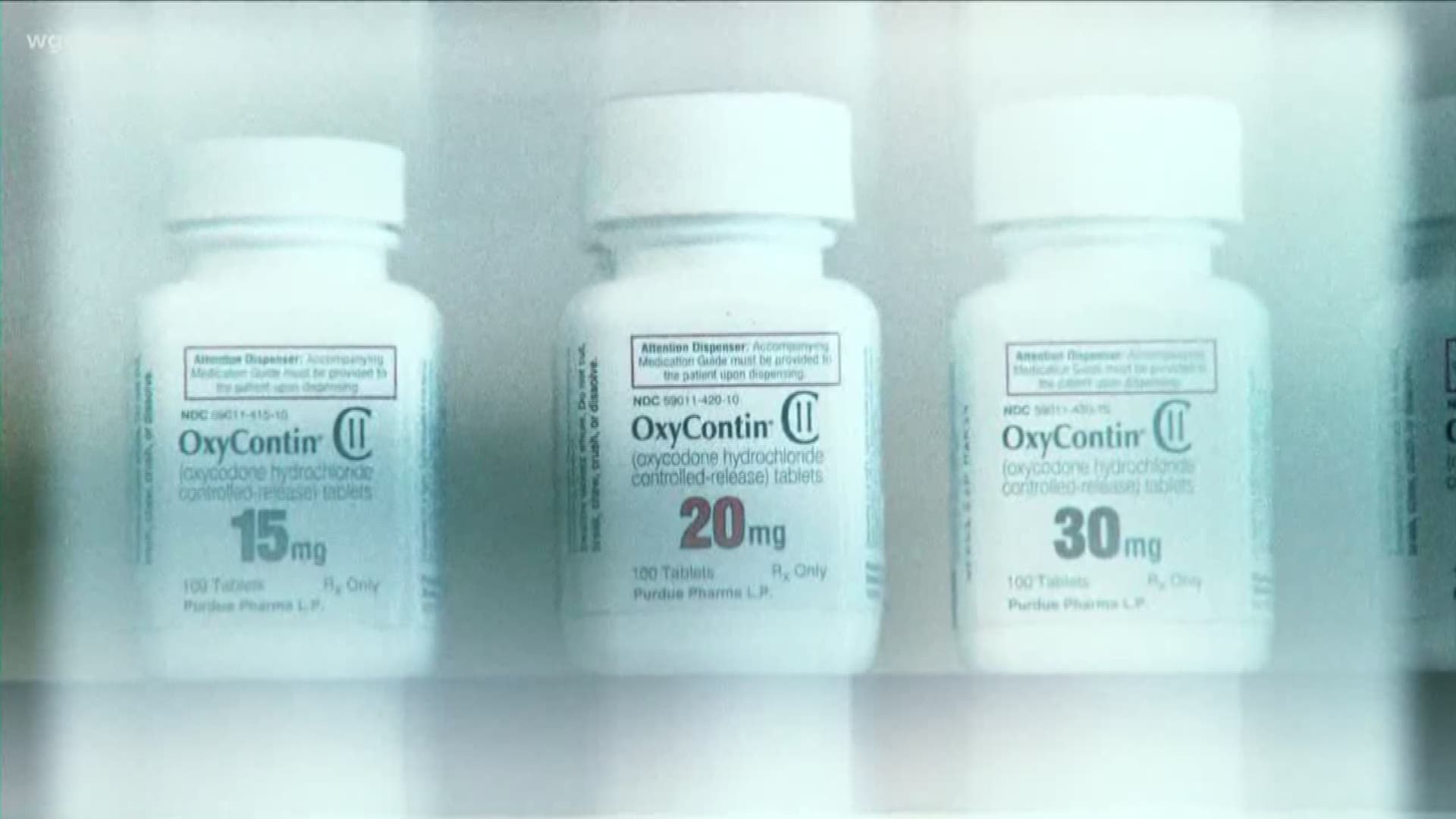NEW YORK — New York on Thursday sued the billionaire family behind OxyContin, joining a growing list of state and local governments alleging the drugmaker sparked the nation's opioid crisis by putting hunger for profits over patient safety.
The state, which averages nine opioid-related deaths per day, amended an existing lawsuit against pill maker Purdue Pharma to add members of its controlling Sackler family as defendants. The state also added as defendants five other companies that produce opioid painkillers and, in what New York Attorney General Letitia James called a novelty, four drug distributors.
"This is an extensive lawsuit that leaves no stone unturned," James, a Democrat, said at a news conference.
The lawsuit seeks penalties and damages that could add up to tens of millions of dollars and a dedicated fund to curb the opioid epidemic. It also seeks to have the companies stripped of their licenses and barred from marketing and distributing painkillers in New York until they abide by strict safeguards.
The companies, the lawsuit said, deliberately betrayed their duties under state drug laws "in order to profiteer from the plague they knew would be unleashed."
The lawsuit described the opioid epidemic as a "statewide catastrophe."
The announcement of New York's expanded lawsuit came two days after Purdue and the Sacklers agreed to pay $270 million to the state of Oklahoma. It was the first settlement in a recent wave of nearly 2,000 lawsuits that the company says could push it into bankruptcy. In settling the case, Purdue denied any wrongdoing.
New York's lawsuit echoes the other cases, alleging the Sacklers' and Purdue's aggressive marketing of OxyContin beginning in the mid-1990s led to massive overprescribing and a scourge of dependency, addiction and death. Once the pills ran out, the lawsuit alleges, many patients craving the same effects turned to cheaper, more potent alternatives: heroin and fentanyl.
New York's lawsuit accuses drug manufacturers of collaborating to falsely deny the serious risks of opioid addiction. It accuses drug distributors of saturating the state with opioids while lacking adequate compliance systems to spot potential red flags. Both groups are accused of lying to state regulators.
Purdue is accused of downplaying the addiction risks and pushing doctors to increase dosages even as the dangers became known, the lawsuit said. Some of the company's marketing tactics included hiring a respected New York City doctor to tout the drug and sending representatives on more than a million sales visits to doctors' offices, the lawsuit said.
Richard Sackler, then senior vice president responsible for sales, proudly told the audience at an OxyContin launch party in 1996 that it would create a "blizzard of prescriptions that will bury the competition," the lawsuit said.
In a statement on the Oklahoma case, the Stamford, Connecticut-based company said the money that will go toward addiction studies and treatment in the state will help people across the country. CEO Craig Landau said the company is committed to "help drive solutions to the opioid addiction crisis."
Members of the Sackler family weren't defendants in the Oklahoma case and voluntarily contributed to the settlement, the company said. "We have profound compassion for those who are affected by addiction," the family said in a statement.
The Sacklers have given tens of millions of dollars to New York City cultural institutions. Several members of the family own multimillion-dollar Manhattan apartments. One has a $5 million Long Island estate.
In the past few weeks, as the accusations against the family have mounted, the Tate museums in London and the Guggenheim Museum in New York have cut ties with the family, and other institutions have come under pressure to turn down donations or remove the Sackler name.
New York's lawsuit underscores the impact of opioid addiction in the state. From 2010-2013, the lawsuit said, there was a three-fold increase in heroin-related deaths in New York. Since 2013, opioid-related deaths in the state have more than doubled and there's been a 30-fold increase in fentanyl-related deaths in New York City.
The lawsuit also highlighted the death of one New York woman: Saige Earley, who was found dead last September in a bathroom stall at the Syracuse airport with a needle in her arm and a boarding pass for a flight to drug rehab in her hand. Earley, 23, had turned to heroin after getting hooked on painkillers when she had her wisdom teeth pulled.
The other defendants in New York's lawsuit are: Johnson & Johnson and Janssen Pharmaceuticals; U.K.-based Mallinckrodt plc, which has an opioid manufacturing plant in Hobart, New York; Dublin-based Endo and Allergan; Israeli pharmaceutical company Teva and the drug distributors McKesson, AmerisourceBergen, Cardinal Health and Rochester Drug Cooperative Inc.
Read New York State lawsuit: Office of NYS Attorney General Opioid Lawsuit
Full statement from Perdue Pharma:
Purdue Pharma and the individual former directors of the company vigorously deny the allegations in the New York State Attorney General’s amended complaint, and will continue to defend themselves against these misleading allegations.
The public announcement of the amended complaints is part of a continuing effort to try these cases in the court of public opinion rather than the justice system.
Such serious allegations demand clear evidence linking the conduct alleged to the harm described, but we believe the state fails to show such causation and offers little evidence to support its sweeping legal claims.
Instead, the state is seeking to publicly vilify Purdue and its former directors while unfairly undermining the important work we have taken to address the opioid crisis.
Purdue’s OxyContin represents less than 2% of total opioid prescriptions and it is approved by FDA, prescribed by doctors, and dispensed by pharmacists. This complaint disregard basic facts about Purdue’s prescription opioid medications including that:
- FDA, the scientific agency charged with approving and regulating medicines in the U.S., has approved OxyContin and other Purdue opioid medications as safe and effective for their intended use;
- Prescription opioids are among the most tightly controlled medicines in the United States, and Purdue’s OxyContin is a Schedule II controlled substance, meaning that it is in a class of medicines with the highest level of control by the US Drug Enforcement Administration (DEA); and
- The first information that healthcare providers see when reading the FDA-approved label for OxyContin is a prominent “black box” warning that includes information about the risks of addiction, abuse, and overdose.
The complaint also fails to note facts about the federal regulation of opioid medications, including:
- In April 2010, FDA approved a reformulated version OxyContin, which Purdue developed with properties intended to deter abuse. Purdue worked for over a decade to develop the new formulation, investing hundreds of millions of dollars, and it was the first opioid FDA approved with abuse deterrent properties.
- FDA has directly addressed many of the scientific issues complained of in the state’s complaint and has continued to determine that Purdue's opioids are safe and effective for their intended use.
- In 2016, the Centers for Disease Control (CDC) issued a new guideline for prescribing opioids for chronic pain (CDC Guidelines). Purdue immediately emailed the guideline to over 150,000 healthcare professionals throughout the country and subsequently distributed thousands of CDC ‘tear sheets’ setting forth the guideline’s recommendations.
We believe that no pharmaceutical manufacturer has done more to address the opioid addiction crisis than Purdue, and we continue to work closely with and governments and law enforcement agencies on this difficult social issue. Since 2000, we have pursued more than 65 initiatives in an effort to minimize diversion and abuse pharmaceutical opioid medications. For example, when Purdue learned that OxyContin tablets could be crushed to defeat the time-release properties and extract the active ingredient, Purdue invested hundreds of millions of dollars to receive FDA approval of the first prescription opioid with abuse-deterrent properties (2010). And when the Centers for Disease Control issued new guidelines for doctors to use prescribing prescription opioids, we promptly sent that updated information to health care professionals.
Purdue Pharma will continue to defend itself in the litigation as it continues to fight for balance in the public discourse so that society can simultaneously help pain patients in need and create real solutions to the complex problem of addiction.
Full statement from Sackler Family spokesperson:
“Expanding this baseless lawsuit to include former directors of Purdue Pharma is a misguided attempt to place blame where it does not belong for a complex public health crisis. We strongly deny these allegations, which are inconsistent with the factual record, and will vigorously defend against them.
Purdue Pharma manufactures an FDA-approved medicine that represents a tiny portion of the opioid market – never more than four percent of nationwide opioid prescriptions and currently less than two percent – while providing life-changing relief for millions of pain patients who need it.
We have always acted properly and are committed to supporting solutions that save lives by preventing addiction and abuse of prescription medicines and treating those who are suffering from addiction. That is why we are voluntarily contributing $75 million to the ground-breaking National Center for Addiction Studies and Treatment, announced earlier this week in Oklahoma.
Solving this complex public health crisis will require collaboration and focus on the real problems our nation needs to address. Government data makes clear that the opioid crisis is growing rapidly because of illicit fentanyl smuggled in from China and Mexico – and headline-seeking lawsuits like this only distract from the important task of identifying real solutions to that crisis.”


